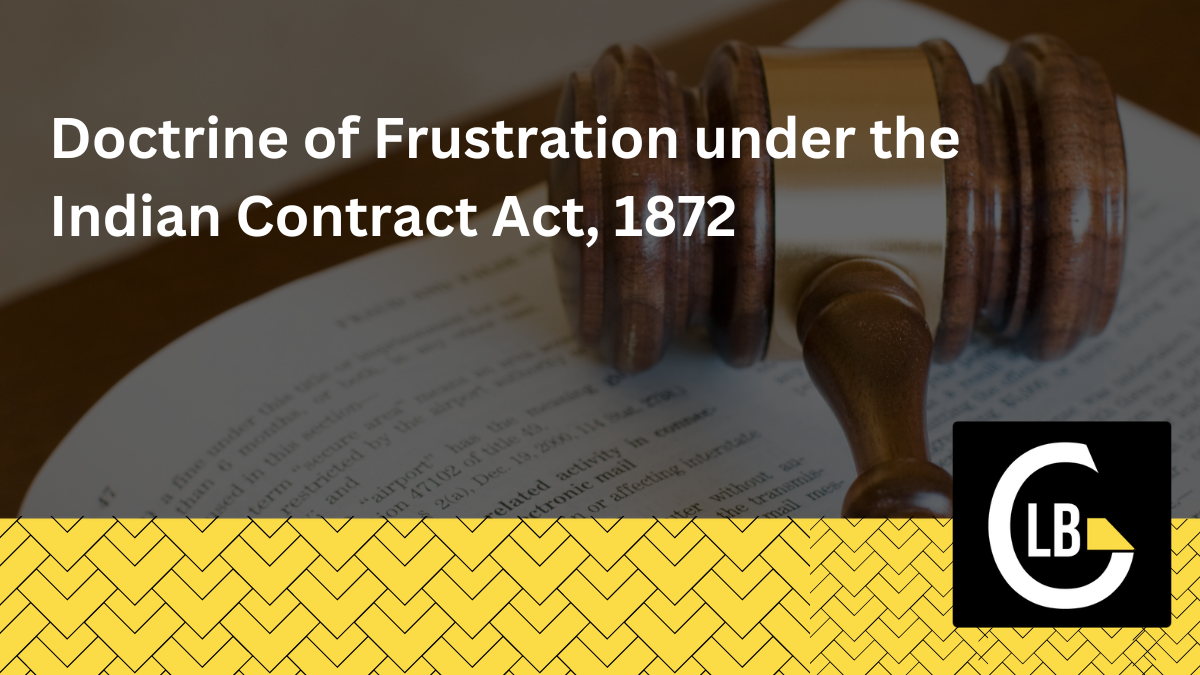In life, things don’t always go as planned, and the same applies to business agreements or contracts. Sometimes, unforeseen events occur that make it impossible to follow through with the terms of a contract. This is where the Doctrine of Frustration comes into play. In India, this is covered under Section 56 of the Indian Contract Act, 1872.
This legal concept allows people to back out of contracts when something unexpected happens, making it impossible or illegal to complete the contract. Let’s break down how the doctrine works in simple terms.
What is the Doctrine of Frustration?
The Doctrine of Frustration kicks in when something happens after a contract is made that makes it impossible to fulfill the contract’s terms. The key point here is that the event must be beyond the control of both parties and something they couldn’t have predicted.
When this happens, the contract becomes “frustrated,” meaning it can’t be carried out, and both parties are released from their obligations. The doctrine exists to ensure fairness, so people aren’t held responsible for things they couldn’t foresee or prevent.
Key Elements of the Doctrine of Frustration
- Performance Becomes Impossible or Illegal:
The event must make it either physically impossible (like the destruction of an important item) or legally impossible (like a new law making the contract illegal) to carry out the contract. - Unforeseen Event:
The event that causes frustration must be something that neither party saw coming. If it was predictable and they didn’t plan for it, frustration may not apply. - No One’s Fault:
The event that makes the contract impossible shouldn’t be the fault of either party. If one of the parties caused the event, they can’t use the doctrine as an excuse to get out of the contract. - Radical Change in Circumstances:
The event must completely change the nature of the contract. It’s not enough if the task becomes harder or more expensive—it has to be something that changes the entire purpose of the contract.
Examples of Frustration
Here are some situations where the Doctrine of Frustration could apply:
- Destruction of the Subject Matter:
If a contract is made to sell a specific item, and that item is destroyed before the sale, the contract is frustrated. - Change in Law:
If the government passes a new law that makes the action required by the contract illegal, the contract becomes impossible to perform. - Death or Incapacity:
If a contract requires personal performance (for example, an artist painting a portrait), the death or incapacity of the person can frustrate the contract.
Section 56 of the Indian Contract Act, 1872
Section 56 of the Indian Contract Act, 1872 talks about two kinds of situations:
- Initial Impossibility:
If the contract was impossible to perform right from the start, it’s void from the beginning. - Subsequent Impossibility:
If something happens after the contract is made that makes it impossible to carry out, and it’s not the fault of either party, the contract becomes void.
Judicial Interpretation of the Doctrine of Frustration
Courts in India have dealt with many cases involving the Doctrine of Frustration. One of the most famous cases is Satyabrata Ghose v. Mugneeram Bangur & Co. (1954). In this case, the Supreme Court of India explained that frustration applies when an event makes the entire purpose of the contract impossible to achieve, not just when it becomes harder or more expensive.
Courts have made it clear that this doctrine is meant for extreme situations, not just minor difficulties or inconveniences.
Conclusion
The Doctrine of Frustration under the Indian Contract Act, 1872, helps in situations where unforeseen events make it impossible to complete a contract. It protects both parties by releasing them from their obligations when something happens that they couldn’t have predicted or controlled.
However, it’s important to understand that the doctrine only applies to extreme cases, where the event completely changes the contract’s purpose. Minor challenges or additional costs aren’t enough to claim frustration.
For individuals and businesses, knowing about the Doctrine of Frustration can help in understanding what to do if a contract becomes impossible to perform due to unexpected circumstances.
